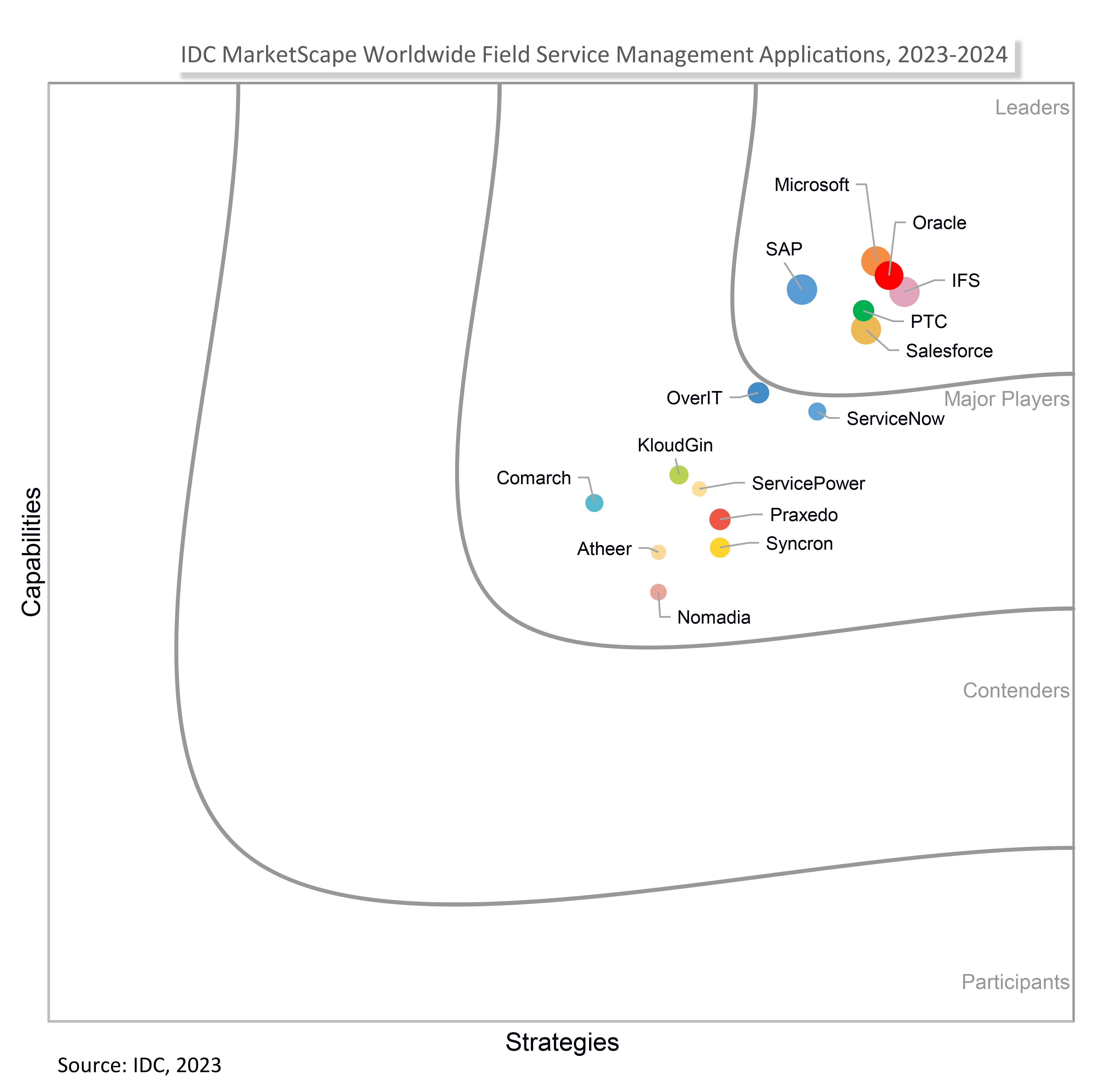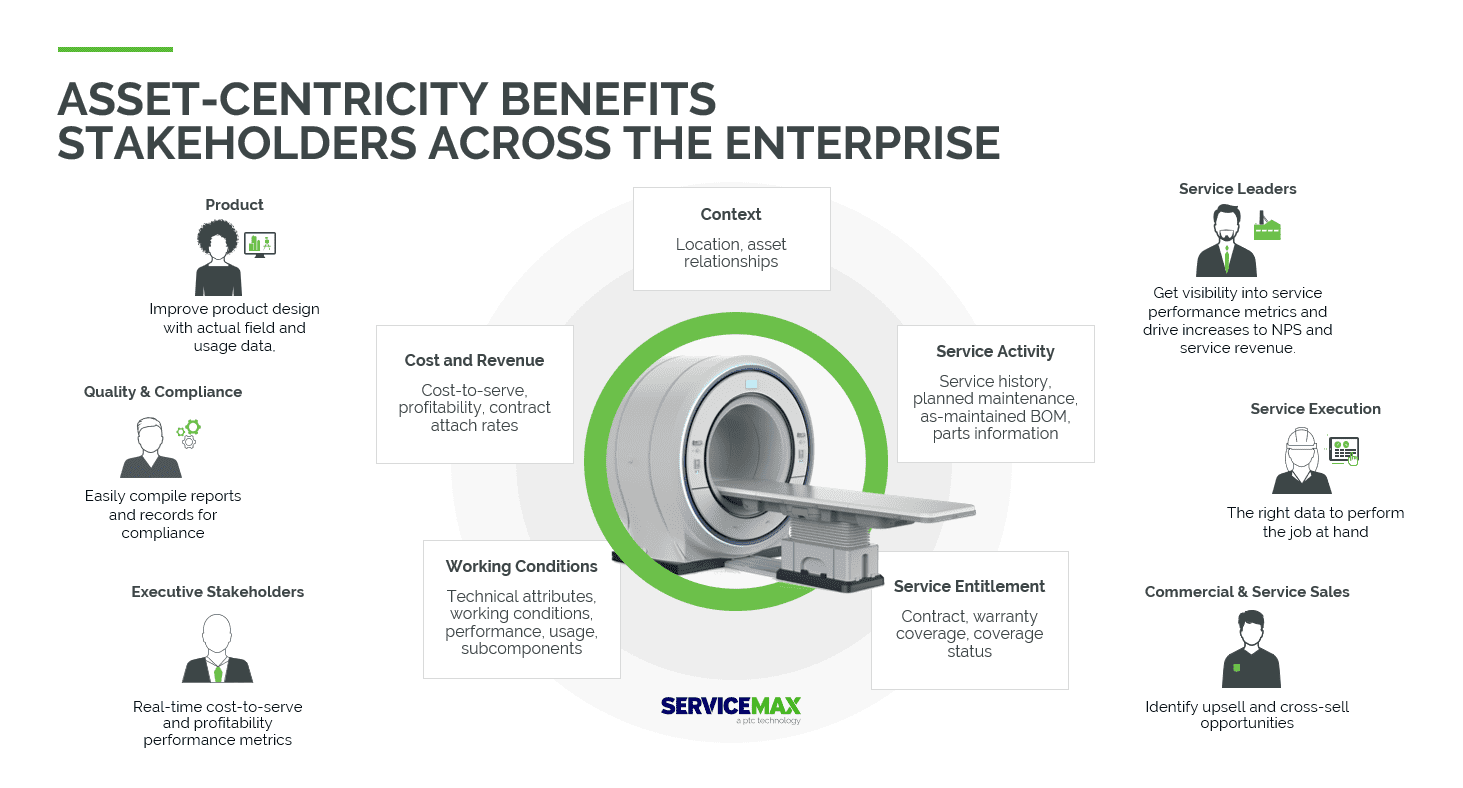PTC has been positioned as a Leader in the IDC MarketScape: Worldwide Manufacturing Field Service Management Applications 2023-2024 Vendor Assessment report (doc #US49989523), published in December 2023. We believe this placement is directly attributable to PTC’s acquisition of ServiceMax in January 2023, which added a robust suite of asset-centric field service management capabilities that significantly expanded PTC’s existing service lifecycle management portfolio.

IDC MarketScape vendor analysis model is designed to provide an overview of the competitive fitness of ICT suppliers in a given market. The research methodology utilizes a rigorous scoring methodology based on both qualitative and quantitative criteria that results in a single graphical illustration of each vendor’s position within a given market. The Capabilities score measures vendor product, go-to-market and business execution in the short-term. The Strategy score measures alignment of vendor strategies with customer requirements in a 3-5-year timeframe. Vendor market share is represented by the size of the icons.
“In previous years, arriving at a customer site was the goal to optimize, but now field service teams need to understand customers, know what failed before arriving, have the right parts/skills to solve the problem on that first visit, and capitalize on additional value-add services while in front of a captive audience: the customer,” said Aly Pinder Jr., research vice president, aftermarket services strategies, IDC.
IDC referenced two key strengths of PTC’s Field Service Management (FSM) solution that played an important role in PTC’s leadership positioning, as detailed below.
- Asset-centric focus and domain expertise in FSM
“PTC’s ServiceMax focuses on field service management and innovation to support complex, asset-centric operations. PTC has established capabilities which enable a variety of service delivery models, from reactive to proactive to predictive to prescriptive … PTC also helps field organizations to mature in this area to be less reactive through automation and connected services establishing more predictive/prescriptive service outcomes,” explained Aly Pinder Jr.

Graphic: FSM impacts stakeholders across the enterprise as a strategic platform to optimize the value of field assets.
As an asset is installed, maintained, and operated, it generates a high volume of data that can be leveraged to gain intelligent insights on current and future performance. These insights benefit stakeholders across the extended enterprise and value chain.
This begins with an operationally minded service organization that needs to understand what needs to be done to ensure the availability of the asset. Beyond operational value, this data also appeals to commercial and strategic stakeholders. Examples include data pertaining to where is the asset located, what is the service or warranty coverage, how is it currently being used, and is its usage nearing full capacity? These are just a few examples of the valuable information that can be collected and shared for intelligent decision support – and the importance of understanding first how an asset is performing.
- Quick deployment and fast return on investment
“PTC has achieved deployments in under a year with an average deployment of between 6-9 months. In a highly complex environment, the ability for field service organizations to rapidly deploy a technology offering and enhance its operations to support customers is crucial. Also, service organizations demand a fast return on their investments, and PTC has been able to help companies accelerate their transformation gaining value from the technology in both the short- and long-term,” said Aly Pinder Jr.
Those familiar with implementing enterprise applications understand there are three key factors that contribute to live delays and budget over-runs:
- Lack of vision or executive sponsor to guide the decision process
- Excessive customization (leading to future support issues)
- Complex systems integration to other enterprise applications
An important part of how PTC engages with prospective customers is the mapping of how field service operations will play a broader role in their digital transformation strategy. By closely aligning enterprise objectives with overcoming field service and support challenges, the ServiceMax team has a successful record in aligning key stakeholders. Initial agreement on cross-functional project objectives coupled with the right success metrics is a great recipe to guide future progress.
Every ServiceMax FSM solution is hosted on the cloud and operates with an open architecture designed to streamline integration, technical support, and future upgrades. PTC understands the need to work as part of an enterprise application ecosystem comprising multiple vendor offerings. Further, given PTC’s rich history of serving asset-intensive industries, most FSM solutions can be implemented with 80 percent or more standard configurations. This is also enabled by the experience of our Global Customer Transformation and Professional Services teams that rely on a value-centered framework to develop and deploy a customer’s field service footprint. Combined, each of these factors consistently contribute to a streamlined FSM implementation that accelerates time-to-value.
“Aftermarket and field service companies should consider PTC when looking for a partner that can improve a wide variety of field service processes while connecting service data with critical enterprise stakeholders to solve complex issues in asset-centric industries. PTC has capabilities to support end-to-end field service management processes that demand automation, collaboration, and real-time insights,” said Aly Pinder Jr., research vice president, aftermarket services strategies, IDC. “PTC has a long history of working with field service organizations across industries to enable improved operations, increased asset productivity, and enhanced customer experiences.”
Field Service Management as an Enterprise Application
FSM has evolved over the past decade into a strategic platform that extends the reach and impact of an enterprise’s digital transformation strategy. Growing complexity of industrial products has placed a new focus on how best to extend a product’s useful life. Meanwhile, elevated customer expectations on performance, insights, and availability have placed considerable pressure on manufacturers to deliver more sophisticated, higher value products.
PTC is uniquely positioned to address this trend by offering solutions that seamlessly integrate engineering and design teams with real-time insights on how assets are utilized in the field. This visibility contributes to better field asset utilization, a lower total cost of ownership, and improved resource productivity to maintain and support these complex assets. Further, engineering teams now have greater insight on future product innovation and quality improvement.
PTC’s Field Service Management solutions empower customer to take an “asset-centric” approach to field service management. This approach provides an ideal foundation to extend the reach of a digital thread.Engineering, production, and service applications can access asset data to create a digital continuous closed loop for data sharing to accelerate product and process innovation.
“We are excited to be recognized by the IDC MarketScape as a Leader in manufacturing field service management applications,” said Sumair Dutta, vice president, product marketing, PTC. “We believe incorporating ServiceMax with PTC’s suite of service capabilities has filled an important customer need to provide an end-to-end solution that is recognized as best-in-class.”
Download an excerpt copy of the IDC MarketScape here.



Share this: